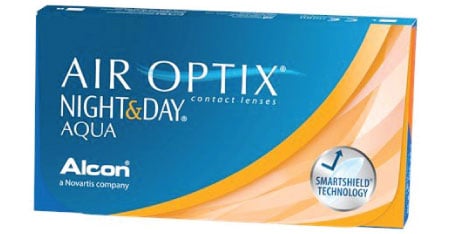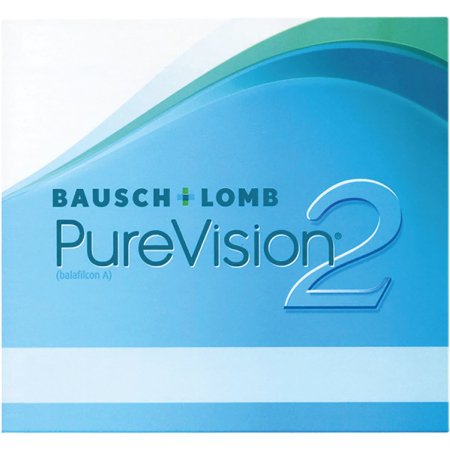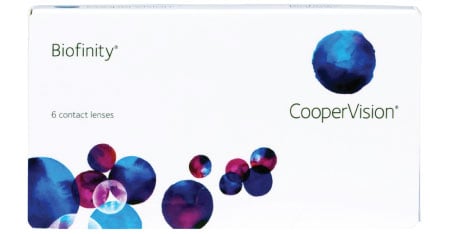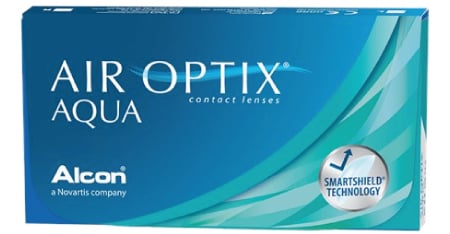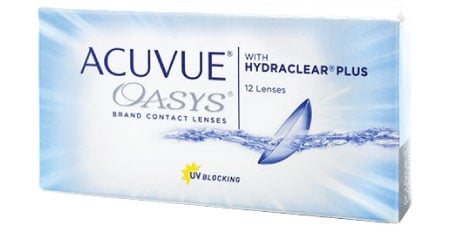Since the advent of soft contact lenses in the 1970s, people have asked their doctors about sleeping in their contact lenses. There are many reasons a patient may choose to sleep in their lenses–whether it is the convenience of constant clear vision or working night shifts, an estimated 40-90% of soft contact lens wearers report sleeping in their lenses.
While the healthiest option for your eyes will always be removing them every night before bed, extended wear or overnight contacts are designed to be a healthier way to reduce (but not negate) the risk of complications. Make sure to always discuss with your optometrist if this wearing schedule is proper for your eyes.
What are day and night contact lenses or extended wear contacts?
Day and night contacts, also known as extended wear contact lenses, are soft contact lenses that can be worn for a set number of days (determined by the manufacturer and approved by the FDA) continuously before being removed. This means that you can sleep in these lenses for a set amount of nights approved by the manufacturer and your doctor. There are currently brands approved for 30 days of continuous/overnight wear, and for 7 days/6 nights of continuous wear. These differ from daily wear lenses, which are not approved for overnight/continuous wear.
The most important factor that sets extended wear lenses apart from daily wear lenses is that they are designed with higher oxygen permeability. This is a measure of the amount of oxygen that passes through the lens and gets to your eye. This is important because the cornea (the clear front part of your eye) depends on proper oxygen transmission to maintain its clarity and health. When you sleep in contact lenses, the amount of oxygen that gets to your cornea is significantly reduced, disrupting the eye’s normal physiological processes. The higher oxygen permeability of extended wear lenses attempts to offset some of this.
Besides depriving your eyes of oxygen, sleeping in your contact lenses also puts you at a higher risk of eye infection due to an overgrowth of bacteria. This is also why you should never wear expired contacts.
Extended wear contact lenses attempt to address and lessen some of these risks.
Extended wear contact lenses are typically made of silicone hydrogel–a flexible plastic material. Silicone hydrogel lenses are more breathable and get more oxygen to your eyes than a non-silicone hydrogel lens.
Are day and night contact lenses safe?
There will always be risks associated with sleeping in contact lenses, even with the healthier silicone hydrogel material. Some of the potential risks are corneal edema, eye infections, and irritation. However, with proper lens care, the risk of getting a serious eye infection with these lenses was found to be about 3-5% in clinical trials, with less than 1% of patients experiencing a permanent reduction in vision.
Some patients’ eyes cannot tolerate the full extended wear schedule and may be more sensitive to sleeping in contact lenses. Never continue to wear contacts that make your eyes feel irritated, light-sensitive, or turn red.
Regular cleaning (with rubbing) of the lenses with a multi-purpose solution, deep cleaning with hydrogen peroxide-based cleaners, and cessation of smoking are all habits that are associated with a lower risk of contact lens-related complications.
Make sure always to insert and remove contact lenses with clean, dry hands.
It is also worth noting that extended wear lenses have passed FDA standards and are considered safe when properly utilized. Handling lenses with dirty hands, not taking proper breaks from overnight wear, and not disposing of the lenses after the approved period are all considered examples of unsafe utilization of extended wear contact lenses.
Can you sleep in monthly contact lenses?
There are only a few brands of monthly contact lenses approved for extended/over-night wear. They are Biofinity lenses, PureVision lenses, Air Optix Aqua, and Air Optix Night and Day lenses. To compare costs of extended wear contacts, you can use our contact price comparison tool here.
- Biofinity and Air Optix Aqua lenses are approved for 6 nights and 7 days of continuous wear.
- The PureVision2 and Air Optix Night and Day lenses are approved for 30 days of continuous wear.
Other monthly brands like Acuvue Vita and Alcon Total 30 contacts are not FDA approved for continuous wear.
Not every patient is a good candidate for extended contact lens wear. Your doctor will take into account your overall health and the health of your eyes when deciding if you are a good fit for overnight lenses.
Some things that may disqualify a patient are health disorders that slow down healing (ex: diabetes, chronic smoking) and a history of repeated eye infections.
Always be honest with your doctor when discussing potential risk factors so they can determine a wear schedule that works for you.
Your doctor may suggest a flexible wearing schedule–this is when you wear the lenses for less than the FDA-approved period–to put less strain on the health of the eyes. Flexible wearing schedules require more upkeep and care.
Is it okay to wear contacts for 24 hours?
It depends. Remember to check the FDA approval guidelines for the specific brand you are wearing and discuss your wearing schedule with your eye care provider. Sleeping in any lenses besides the ones listed above is not FDA approved.
Patients with certain professions, especially those in the health-care and first responder field, may find it easier to choose a lens brand that is approved for sleeping to ensure they are quickly (and clearly) available to work. You can think of a firefighter sleeping at the firehouse who needs to be able to quickly respond to an emergency at a moment’s notice.
Your occupation and hobbies should be taken into consideration when thinking about which wearing schedule may be best for you. For example, if you don’t need extended wear lenses but spend a lot of time outside, wearing Acuvue Oasys with Transitions could make sense for you.
Can you sleep with contacts for 1 hour?
Taking short (< 30-minute naps) in your lenses may happen from time to time, and if kept infrequent, will not likely lead to any long-term damage to the eye.
- It is important to consider that lens brands not approved for extended wear may have lower oxygen transmission– making sleeping in them that much more dangerous!
- If you find yourself often napping in your lenses, it may be worth it to consider switching to continuous wear lenses.
- Napping in your lenses can lead to dry contact lenses and red, irritated eyes. Make sure to clean or re-wet your contact lenses after you take a nap in them.
What if you wake up and contact find the contact lens in your eye?
If you lose a contact in your eye, don’t panic. Here are a few simple steps to take to find and remove a lost contact in your eye.
Are daily contacts better than monthly?
Daily contact lenses are healthier for the eyes when used properly because they are cleaner and easier on the eyes. Patients suffering from chronic allergies and dry eyes may benefit more from daily lenses, and they can feel more comfortable due to their thinner design.
Related: See the best contacts for dry eyes.
- Daily contact lenses have lower oxygen transmission than extended wear lenses, meaning that sleeping in them or over-wearing them beyond a day can be damaging to the eye.
- Because daily lenses are meant to only be worn once and then discarded, there is no such thing as extended wear daily lenses.
- For many people, daily contact lenses have the potential to be just as convenient as extended wear lenses because they do not require cleaning or storage.
Top Extended Wear Contact Lenses
Air Optix Night and Day
- These lenses have the highest oxygen transmission of the soft contact lenses on the market and are therefore the most popular overnight contact lenses.
- Shop for Air Optix Night and Day Now
PureVision2
- These lenses are a lot older and less breathable than the Air Optix Night and Day lenses, but they are the only other lens approved for thirty days of continuous wear.
- Shop for Purevision2 Now
Biofinity
- These lenses are approved for 6 nights of continuous wear, so they can only be guaranteed to be safe during this period of time.
- Shop Biofinity Now
Air Optix Aqua
- Like the Biofinity lenses, these lenses are approved for 6 days of continuous wear, so they can only be guaranteed to be safe during this period of time.
- Shop Air Optix Aqua Now
Acuvue Oasys
- Like the Biofinity and Air Optix Aqua lenses, these lenses are approved for 7 days of continuous wear, so they can only be guaranteed to be safe during this period of time.
- Shop Acuvue Oasys Now

Dr. Morgan Jones is a Doctor of Optometry (O.D.) completing a residency in ocular disease. She has experience in diabetic research, along with several years of clinical research. Along with being a community outreach leader and an avid mentor and tutor, she enjoys educating outside of clinic. Dr. Jones has a B.A. in Biology from Texas A&M University.
